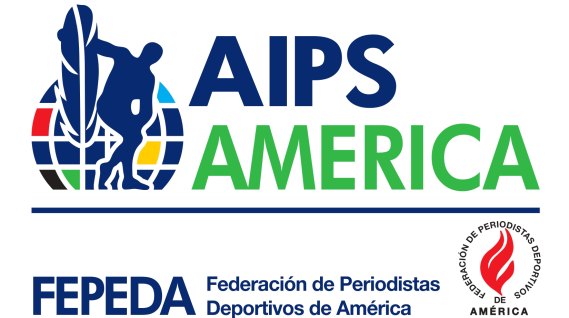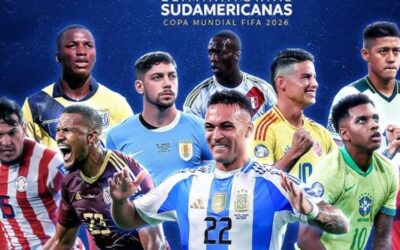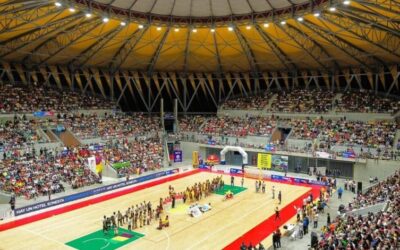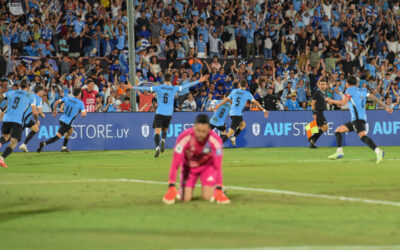Por: Estewil Quesada Fernández – Miembro Acord Colombia
BARRANQUILLA, Colombia, 13 de agosto de 2017.- El barranquillero es el periodista deportivo vigente de mayor edad en el mundo: 97 años. Es el único sobreviviente fundador de Acord Colombia, hace 69 años.
Don Chelo de Castro C. se disculpa. Por tercera vez en hora y media de conversación se le ha olvidado un nombre. «Es que la memoria comenzó a fallarme», dice, mirándome de forma apenada.
- Chelo De Castro trabajando en su oficina. / Chelo De Castro working at his office.
- Chelo De Castro en Sala de Redacción. / Chelo De Castro at the newsroom.
–Tranquilo, maestro, le digo–. Pocas personas hay en el mundo como usted, que casi con 97 años tienen esa lucidez y ejercen el periodismo. Usted es motivo de orgullo para el periodismo colombiano, en especial el deportivo, y para Barranquilla por su condición de barranquillero autóctono (es el periodista deportivo, y tal vez en general, activo de mayor edad en el mundo)…
Don Chelo hablaba del caso del arquero José Escorcia, que mató de una patada al hígado a un compañero, por discusión en un juego de dominó en la casa alquilada por la Liga de Fútbol del Atlántico en el centro de la ciudad, en la década del 40. Y como no recuerda el nombre de la víctima, se lamenta. Pero todo el suceso lo entrega con detalles, como si hubiera ocurrido ayer y no hace más de 70 años. Habla de ello, porque le pido su relación con un compañero de trabajo, un tal Gabriel García Márquez, que le mandaba a preguntar cómo fue aquello.
Estamos él y yo solos en la sala de su casa de dos pisos esquinera, una cuadra arriba de la calle 72, en el norte de la capital del Atlántico. Mi compañera, la reportera gráfica, se marchó. Y uno de sus hijos, que por minutos escuchó con atención la entrevista, se ha ido al estudio contiguo a ver por televisión, sin volumen, lo que sería la remontada histórica del Fútbol Club Barcelona.
Desde diciembre pasado, por los días que murió su colega y amigo Mike Schmulson, el editorial de Chelo no sale a diario, de lunes a viernes, como ocurrió en los últimos 40 años en las páginas deportivas de El Heraldo. Sale una, dos o tres veces a la semana. Por años la escribía en cuestión de minutos en la misma sala de redacción, pero luego llegaba con varias ya elaboradas.
«Escribía en casa, en cualquiera de las cinco máquinas de escribir que tengo. Tenía muchas y ahora no me sirven para nada. Tengo problemas de vista y me resulta imposible escribir. Ahora todos los temas los escucho, no como antes que los leía. Y le dicto a un nieto, Chelito de Castro (21 años, estudiante de Negocios Internacionales). Estamos compenetrados para no pasarnos del espacio que dispongo. Y las mando».
‘NO TODO TIEMPO PASADO FUE MEJOR’
En esa columna, que ha pasado por varios medios impresos ya desaparecidos como La Prensa, El Nacional y Diario del Caribe, tras comenzar en el semanario La Unidad –en 1945, llevado de la mano de Marco Aurelio Vásquez, ‘Niño Yeyo’-De Castro compara o trae casos del deporte actual con el del ayer.
Por ello hay quienes lo tildan que se quedó en el pasado. Y si lo escuchan afirmar que el mejor futbolista colombiano que observó fue al barranquillero Gabriel Diazgranados (centrodelantero del 40 que aprendió fútbol en Inglaterra), podrían argumentar que esa es una prueba absoluta. Pero las palabras del maestro echan por tierra ese pensamiento, con un ejemplo de uno de los deportes que lo apasionan, al lado del boxeo y atletismo, como es el béisbol.
«En Carlos ‘Petaca’ Rodríguez se perdió el primer pitcher profesional colombiano que hubiera podido llegar a Grandes Ligas. Era original. No tenía gran velocidad, no tenía gran control, no tenía gran curva; pero tenía algo de cada una de esas cualidades y era dominante. ‘Petaca’, ‘Chita’ Miranda y Tomás Arrieta fueron los grandes de la mitad del siglo pasado. Pero el más grande de todos en Colombia es Édgar Rentería, por su prodigiosa carrera en Grandes Ligas… Soy de los que considero que no todo tiempo pasado fue mejor», afirma convencido.
Igual opina sobre el periodismo de ayer y el de hoy…»El periodista actual tiene mejor formación profesional que el de antaño: sale de una universidad preparado. El mal que tiene es que lee poco. No cultiva la lectura. Y los de deportes, casi todos, menosprecian la historia deportiva».
RADIO HACE 64 AÑOS
Don Chelo también hace radio. Su espacio se llama Desfile Deportivo y se emite por Radio Aeropuerto, de lunes a viernes. Es informativo y remata con un editorial. Antes era el mismo de El Heraldo. El programa lo creó el 7 de abril de 1953, en compañía de Schmulson, y en la emisora que más duró fue la Voz de la Patria, durante cuatro décadas. A la emisora ahora va, llevado por uno de sus siete hijos que tuvo con Judith Vásquez, su esposa. Hasta hace poco, iba y venía solo, como al periódico, cogiendo bus y llevando un ejemplar del diario o una bolsa de pan.
Por años, en la rivalidad deportiva entre Barranquilla y Cartagena, De Castro tuvo un duro competidor en la capital de Bolívar, otro líder ya fallecido, Melanio Porto Ariza, ‘Meporto’. «Era el gran pretexto para tener viva la realidad de ambas ciudades… De ‘Meporto’ guardo un gran recuerdo. Cuando salí de la Voz de la Patria se vino a Barranquilla a conseguirme una emisora».
Don Chelo se le paró en polémica deportiva al narrador Édgar Perea, cuando ‘El Campeón’ era el dueño de la sintonía. Así describe a la leyenda: «Édgar era capaz de pelear contigo en el micrófono, pero salía de la emisora y si te encontraba te daba un abrazo. No guardaba rencor».
José Víctor de Castro Carroll nació el 19 de marzo de 1920 en el barrio San Roque, en Barranquilla. El llamado de Chelo es una herencia que mínimo dice, viene de su abuelo. En casa de sus padres hubo cultura deportiva. Su hermano mayor, Chelo de Castro Tavera, fue el más grande promotor de boxeo colombiano en la primera mitad del siglo pasado. Parientes como Arturo de Castro trajo de Inglaterra el primer balón para el inicio del fútbol en Colombia.
Don Chelo es el único sobreviviente de la reunión organizativa en Barranquilla cuando se creó la Asociación Colombiana de Redactores Deportivos (Acord) en marzo de 1948. Y es el más antiguo socio de Acord Atlántico, que se fundó antes, en 1946.
«Soy reacio a la mezcla del deporte aficionado y profesional, pero ya perdí esa pelea. Ahora hasta los Juegos Olímpicos son profesionales. No hay nada que hacer», dice el hombre que también por algún tiempo ejerció como Comisionado de Boxeo en la capital atlanticense.
DEFENSOR DE BARRANQUILLA
Con el fin de reconocer los valores deportivos de la ciudad, emprendió una campaña y salió victorioso para bautizar a varios ‘estadios municipales’. Así, el de béisbol, recientemente derrumbado, se llamó Tomás Arrieta; el también destruido coliseo Humberto Perea; el de fútbol, Romelio Martínez; el velódromo, Rafael Vásquez; y el nuevo de fútbol, Roberto Meléndez.
«Los héroes deportivos son a perpetuidad. No es quitarle el nombre para ponerle a otro que sea mejor», dice, oponiéndose al nombre del nuevo estadio de béisbol que se llamará Édgar Rentería. «Pueden hacer otro y ponerle el nombre de Rentería», afirma.
Don Chelo confía que con los Juegos Centroamericanos y del Caribe de 2018, Barranquilla recupere el liderazgo que tenía en el pasado. «La pujanza de la ciudad antes daba para todo. El estadio Romelio Martínez ha sido el único gran escenario del país construido solo con dineros propios, lo hizo las Empresas Públicas Municipales. Pero luego la ciudad decayó por su clase de dirigentes y, cuento algo que no se sabe en este tiempo, los Juegos Panamericanos de 1971 se iban a realizar en Barranquilla, pero un barranquillero, Julio Gerlein Comelín, decidió que mejor se hicieran en Cali, como al final sucedió, todo por esa desidia».
Como barranquillero cree que Junior es lo más representativo de la ciudad y que ‘Kid Pambelé’ es el deportista más destacado de Colombia en todos los tiempos. Dice amar su profesión de periodista y que si volviera a nacer, de nuevo sería comunicador.
Maestro: ¿usted se considera el barranquillero más auténtico de este tiempo? –le pregunto para terminar.
Don Chelo, el autor de dos libros y de términos acuñados al hombre de la capital del Atlántico, como la pregunta ‘pringamocera’ (con veneno), el defensor de la ciudad, de nuevo me mira de forma apenada, como cuando se le olvidó por tercera vez un pequeño dato. Toma aire y responde:
“No soy la persona adecuada para responder esa pregunta –dice–. Pero para que un tipo me supere en eso, necesita tener una trayectoria de 72 años de defensa de Barranquilla en prensa y 64 años en radio. Búscame a uno y seguimos hablando”…
—–
ENGLISH:
Don Chelo de Castro, 72 years of journalism
By: Estewil Quesada Fernández – AIPS Member
Traslated By: Constanza Mora Pedraza – AIPS Member
BARRANQUILLA, COLOMBIA, August 13, 2017.- The journalist who was born in Barranquilla, Colombia, is the oldest active Sports Journalist in the world. He is 97 years old. He is the only surviving founder of Acord Colombia, 69 years ago.
‘Don Chelo’ de Castro C, apologizes as for the third time in an hour and a half of conversation he has forgotten his own name, «my memory started to fail me» he says, looking at me in a distressed way.
«No worries,» I said. There are few people in the world like you who almost at 97 years have that lucidity and still being a journalist. You are a reason for Colombian journalism to be proud of, especially the sports ones, and for Barranquilla, because of your status of proper ‘barranquillero’ (he is the Sports Journalist, and maybe in general journalism, the oldest active in the world).
‘Don Chelo’ spoke about the case of a goalkeeper called Jose Escorcia, who killed one of his mates from a kick in his liver, during a discussion while playing a dominó game, in a house that was rented by the Atlántico Football League in the city center in the 40´s. And as he does not remember the name of the victim, he regrets again. But he speaks about it and gives all the details, as if it had happened yesterday and not more than 70 years ago. He talks about it because I ask him about his relationship with a colleague, -someone called Gabriel García Márquez-, who requested to ask how that was.
We are only him and I alone in the living room of his two-floor house, located at the corner, one block from the 72 street, at the north of Barranquilla, the Atlantico’s capital. My colleague, the photographer, had left, and one of his sons, who had listened attentively for a few minutes, went to the studio next door to watch on TV, -without volume-, what would be the historic victory of Barcelona Football team.
Since last December, when his colleague and friend Mike Schmulson died, Chelo’s editorial is not published daily, from Monday to Friday, as it happened for the last 40 years in the sports section of El Heraldo, a newspaper of the region. Nowadays it is published one, two or three times a week. For years he wrote it in a matter of minutes in the same newsroom, but then he used to come to the newspaper with several already wrote.
«I used to write at home, in any of the five typewriters I have, I had many and now they are useless to me: I have sight problems and it is impossible for me to write. Now I also have to hear everything, not as before that I read it, I have to dictate to my grandson, “Chelito” de Castro (21 years old and International Business student). We are aligned to not going beyond the space, and then I send them”.
‘NOT ALL PAST TIME WAS BETTER’
In that editorial, that has gone through several print media companies already disappeared as ‘La Prensa’, ‘El Nacional’ and ‘Diario del Caribe’, after starting in the weekly ‘La Unidad’ – in 1945, with the company of Marco Aurelio Vásquez, –, De Castro compares or brings cases of nowadays sport with the ones of yesterday.
That is why there are those who say he lives in the past. And if you hear him saying that the best Colombian footballer he saw was Gabriel Diazgrandos from Barranquilla, (midfielder at the 40’s who learned football in England) they could argue that this is enough proof. But the words of the master, overthrow that thought, with an example of one of the sports he is passionate about, besides boxing and athletics, baseball: “In Carlos Rodríguez we lost the first Colombian professional pitcher who could have reached the Majors Leagues. He was original, he did not have great speed, he did not have great control, he did not have a big curve, but he had some of each of those qualities and he was dominant. Carlos, ‘Chita’ Miranda and Tomás Arrieta, where the greatest by the half century, but the greatest ever in Colombia is Édgar Rentería, for his successful career in the Major Leagues … I am one of those who do not think that old times were better”.
He thinks in the same way about journalism from yesterday and today.
«The current journalist has better professional training than the one of old times: they leave the university very well prepared, but the biggest problem that journalists have is that they reads too little, and the sportsmen despise sports history.»
RADIO 64 YEARS AGO
‘Don Chelo’ also works in radio. His program calls Desfile Deportivo (Sports Parade), and it is transmitted by Radio Aeropuerto (Radio Airport), from Monday to Friday. It is informative and ends with an editorial, which used to be the same as El Heraldo. The program was created along with Schmulson on 7th April 1953, and at ‘La Voz de la Patria’ (Voice of the Motherland) was the radio station where it lasted the most, for four decades. Now days, he visit the radio station taken by one of his seven children he had with Judith Vásquez, his wife. Not long ago, he used to come and go by himself, as well as to the newspaper; catching a bus and carrying a copy of the newspaper or a bag of bread.
For many years, in the sporting rivalry between Barranquilla and Cartagena, De Castro had a tough competitor in the capital of Bolívar; another leader who already died, Melanio Porto Ariza. «Sports rivalry was the great pretext to keep alive the reality of both cities; I keep a great memory of him: when I left ‘La Voz de la Patria’ (Voice of the Motherland) he came to Barranquilla to get me a job in a radio station.
‘Don Chelo’ stepped by, in a sports controversy in front of the greatest narrator in Colombia, Édgar Perea, when ‘The Champion’ as Perea’s was known, was the owner of the audience. «Edgar was able to fight you in the microphone, but if he met you after, he would give you a hug. He was not resentful.
José Víctor de Castro Carroll was born on the 19th March 1920 in San Roque, a neighborhood of Barranquilla. Chelo’s is a nickname inherited, he says, from his grandfather. In their parents’ house there was sports culture. His older brother, Chelo de Castro Tavera, was the greatest promoter of Colombian boxing in the first half of the last century and relatives like Arturo de Castro brought from England the first foot-ball used for the beginning of the football in Colombia.
‘Don Chelo’ is the only survivor of the Colombian Sports Press Association (Acord) which was created in March 1948. And he is the oldest member of Acord Atlántico, which was founded in 1946.
«I am reluctant to mix amateur and professional sports, but I already lost that fight, even now the Olympic Games are professional», said the man who also was a Boxing Commissioner in Barranquilla.
BARRANQUILLA’S DEFENDER
In order to recognize the sporting values of the city, he undertook a campaign that emerged victorious, to baptize several ‘municipal stadium’. Thus the one of baseball, recently collapsed, was called Tomás Arrieta; the coliseum also destroyed, was called Humberto Perea; the football stadium got the name Romelio Martínez, the velodrome is now called Rafael Vásquez and the new football stadium, Roberto Meléndez.
«Sports heroes are everlasting. The point is not taking the name off to put another one that is better», he says, making an opposition to the name of the new baseball stadium named Edgar Renteria. «They can do another and put the name of Renteria”.
‘Don Chelo’ hopes that with the Central American and Caribbean Games 2018 Barranquilla will regain the leadership the city had in the past. «The strength of Barranquilla gave for everything before». The Romelio Martínez Stadium has been the only biggest venue of the country built with its own money: it was made by the Public Municipal Companies. But Barranquilla went down because of their leaders and I will tell something that it is unknown this time, The Pan-American Games 1971 supposed to be held in Barranquilla, but someone born in this city, Julio Gerlein Comelín decided that it was better to do those games, as it was, in Cali, just because of that laziness”
As a ‘barranquillero’ he thinks that Junior, the football club, is the most representative of the city and that ‘Kid Pambele’ is the Colombian most outstanding athlete of all the times. He says he loves his profession as a Journalist and that if he born again, he will be a journalist once more.
¿Do you consider yourself to be the most authentic ‘barranquillero’ this time? I asked him before finishing.
‘Don Chelo’, the author of two books and terms coined to the man from the Atlantico’s Capital, like the question ‘pringamocera’ (with poison), the defender of the city, once again look at me in a distressed way, as when he forgot for third time a small detail. He takes a breath and answer:
“I am not the right person to answer that question. But for a guy to go on top of me in that matter, he needs to have an experience of 72 years of Barranquilla’s defence through the press and 64 in radio. Find me one and we will continue talking…”





